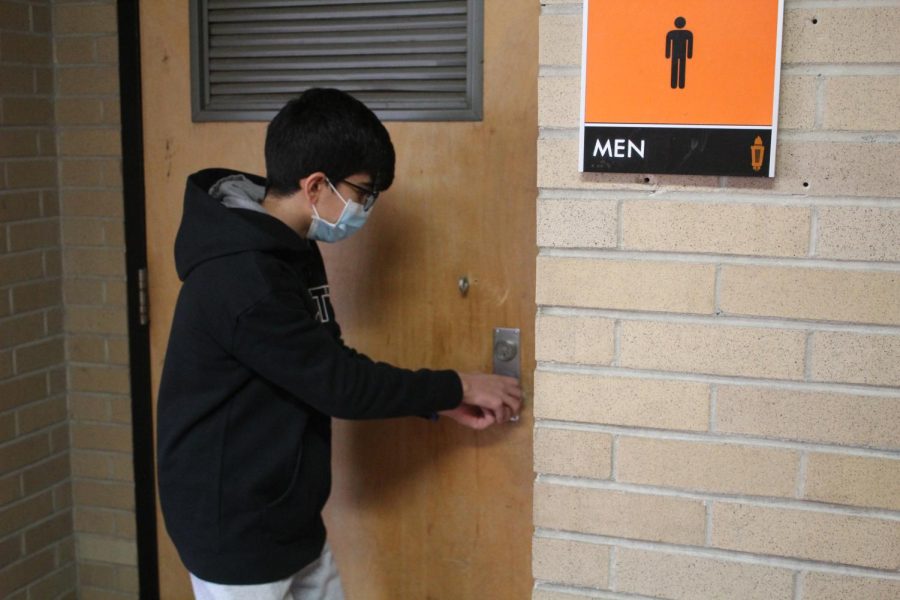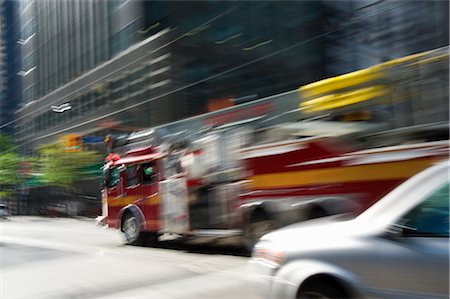Bathroom Blues
Mohammed Alali faces disappointment in B-hall on Dec. 9, 2021. “I felt a burst of anger,” Alali said. This is a very frustrating situation, especially when one goes from bathroom to bathroom and they are all locked.
The bathroom situation this school year at Dearborn High is a mess. Policies aim to limit lost class time, hallway traffic, and drug/nicotine use; students, meanwhile, still need to use the bathroom. Some teachers are strict, while others are very loose. Recently, all of the bathrooms have been locked during the lunch hour, save the bathroom right outside the cafeteria (D-hall) and sometimes another bathroom in B-hall, which has annoyed the student body. Additionally, bathrooms are often locked without warning or reason, which leads students to believe they are being punished, especially when teachers are equally in the dark about the situation. However, according to Principal Jebril, she doesn’t “believe in collective punishment” and bathrooms are only locked due to a shortage of security guards or for maintenance issues, so this seems like a case of miscommunication. Our administration should consider modifying the bathroom policy to help both students and staff, and should be more open about their intentions.
Instituting bathroom restrictions during lunchtime creates a choke point of sorts, where students can’t really use the bathroom at all during the fourth hour. The only people that can reasonably use the bathroom during that time are students at lunch, and even then, it’s only the students that are willing to wait in line. There would therefore be a larger volume of students trying to go during fifth hour classes. Shifting a large amount of bathroom use off of one class period puts it in another class period, which is especially troubling when many teachers only let one student out at a time or none at all during lectures. The other bathrooms should remain open during the lunch hour to eliminate this effect.
Another effect of locking bathrooms is the increased impact of any one bathroom’s failure. When a bathroom at DHS has a maintenance issue, it is locked until the issue is resolved. When combined with the lunchtime locking, the bathrooms become very vulnerable to problems. Just the other day, I went to use the bathroom during the fourth hour, but the boys’ bathroom by the cafeteria (which is supposed to remain open) was locked. If this was due to an issue that needed to be fixed, having other bathrooms open during that time would make a lot more sense. If nothing else, the other bathrooms should at least remain open when the D-hall bathroom is having problems.
Staff should also communicate with students so there are no misunderstandings about the bathrooms. When bathrooms are locked, students tend to think it is as a punishment for something, because we are so used to having the bathrooms treated as a privilege to be given and taken. According to Principal Jebril, however, bathrooms are not locked as collective punishment; they are only locked due to shortage of staff, for maintenance, or at regular times (like the lunchroom policy). The locking that seems random or punitive is likely due to the former two factors. This could be easily telegraphed with some kind of sign or announcement (“out of order”, “short-staffed”) instead of just locking the bathrooms and moving on. Communication goes a long way to show students that administrators don’t see their needs as trivial.
A better system to control traffic and student behavior would be to close bathrooms during passing time and keep them open and easy to use during class time. While this may seem strange, since it is the opposite of what is currently encouraged, it would make it a lot easier for all parties. If we can only use the bathroom during passing time, that is a lot of students all trying to use the bathroom within the same seven minutes, which makes it more difficult for students to use the bathroom and for staff to keep them controlled. If we could instead only use the bathroom during class periods, that opens up more time to use the bathroom, so there would be far fewer students in the halls at a given time than during passing periods. The low volume of students should make it easier for security or other staff members to police them. A possible issue with this strategy is that it takes time away from class, particularly when students purposefully take as long as possible. Since using the bathroom is not typically a very long activity, this problem could be mitigated by marking students tardy or absent after a generous period of time, around ten or fifteen minutes.
As many bathrooms should stay open as possible to avoid problems with maintenance and keep traffic flowing smoothly, and it should be encouraged during class time for the same reasons. Using the bathroom is an unavoidable part of daily life, so it should be made a lot easier. Bathrooms are not the enemy.




